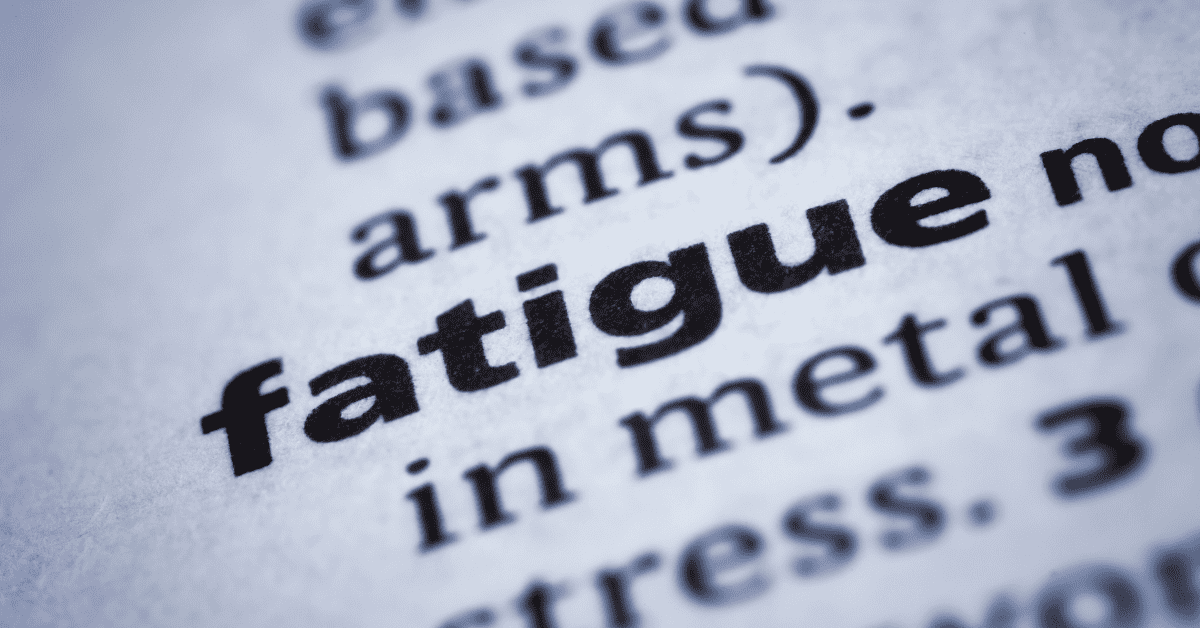So how is life with Lupus in 2023?
Tiring, to say the least?
In 2020, Lupus Europe did a survey of 4375 patients with physician-confirmed Systemic Lupus Erythematosus from 35 European countries. One key takeaway is that most patients struggle with fatigue more than any other symptom. With 85% of their respondents fighting fatigue each day. [1]
Fatigue appears to be part and parcel of living with systemic lupus. In effect, it is one of the symptoms of lupus that is hidden from plain sight. Although fatigue is a common symptom of Lupus, it’s also something people don’t talk about. It is one that lupus warriors appear to accept.
Still, fatigue has a major impact on your quality of life. [2]
It has been said to be the “most disabling symptom of the disease,” frequently leading to unemployment. [3]
If you experience fatigue, it’s important to know how to manage your symptoms to live a healthy and happy life. In this article, we’re going to look at the link between lupus and fatigue and how you can overcome it!

What is Fatigue?
Fatigue is the inability to maintain a normal level of activity. It’s not all about feeling tired. It is also having a lack of energy, motivation and concentration. Some even experience difficulty in thinking clearly or remembering things because of mental exhaustion.
Fatigue is “multidimensional” because it can be different for each person. [4]
Depending on your medical conditions, fatigue can be the most unpleasant symptom to cope with. It can amplify the tiredness you experience in life… e.g., not getting enough restful sleep as a parent. Besides, dealing with life stressors like financial problems or relationship issues (or both).
We all have days where we don’t feel like being productive. But if your fatigue has lasted more than two weeks and it’s starting to affect your life, this article and these tips should help.

How Fatigue Can Impact Your Life
Fatigue can impact your life in many ways.
It can impact your quality of life, making it difficult to do the things that you enjoy and care about. Fatigue may also affect your work performance. Which in turn can impact your relationships with co-workers as well as reduce the amount of money you could earn. [5]
This may make you feel isolated or alone because other people don’t understand what you’re going through when they see you fatigued all the time (and sometimes even when they don’t!). [6]
You may also struggle to get all your chores done at home or at work. Creating an ever-growing To Do list where there is more on your plate than you can chew.
The link between Fatigue and Systemic Lupus
In simple terms, fatigue is when you feel tired and have little energy.
People with systemic lupus can experience fatigue for many reasons, including:
#1. Disease Activity & Inflammation
Fatigue can be because of your lupus and the inflammation it creates. It can be tiring work for your body to beat up your healthy tissue I’ll have you know.
Inflammation forces your body to work harder and use up more energy. What’s more, this activates your immune system, using up more energy and disrupting the normal functioning of cells and tissues. This can lead to fatigue, headaches, muscle aches, and lack of energy.
Inflammation also affects the way cells produce energy, making it harder for them to do so, which again causes fatigue and less physical activity. [7]
What’s more, people with lupus who are still experiencing symptoms, also called “active disease,” are more likely to feel fatigued than those who are in remission. [3]
The same applies to those with lupus nephritis as fatigue is common in those with kidney issues. Possibly due to depressive symptoms, restless legs syndrome, excessive daytime sleepiness, and/or low albumin levels. [8]
#2. Tryptophan Metabolism
Lupus patients appear to have issues metabolising the amino acid, ‘tryptophan’. [9]
Tryptophan is the amino acid that many say is the reason you feel sleepy after eating turkey. ‘Kynurenine’ is made from tryptophan and is controlled by your immune system. High levels of kynurenine have links to autoimmune diseases such as lupus. [10] Likewise, the same is seen in people with chronic fatigue syndrome. [11]
A 2018 study found that elevated kynurenine levels were associated with fatigue and in patients with systemic lupus. [12] What’s more, high levels of kynurenine are shown to affect your mental ability and mood with lupus. [13]
#3. Lupus Medications
Another contributor can be the medicines you take. Some medications used to treat lupus can make you feel tired as a side effect. Prime examples are steroids and drugs that suppress the immune system. [14]
For example, the hypothalamic-pituitary-adrenal (HPA) axis is a complex system in the body that regulates the release of cortisol, a stress hormone. Cortisol plays a crucial role in regulating many physiological processes, including metabolism, immune function, and response to stress.
Prednisone, being a corticosteroid, can disrupt the normal functioning of the HPA axis. Even in low doses, it can suppress the production of cortisol, leading to a condition known as adrenal insufficiency. [15][16] This reduction in cortisol levels can cause fatigue, as well as other symptoms such as weakness, dizziness, and stomach issues. [17]
In addition to suppressing cortisol production, prednisone can also disrupt normal circadian rhythm and sleep patterns, which can further contribute to fatigue. [18]
It is important to note that the extent to which prednisone affects the HPA axis and causes fatigue will depend on various factors, such as the dose, duration of treatment, and the individual’s overall health. If you are taking prednisone and are experiencing significant fatigue, discuss it with your doctor.

What else causes fatigue? It’s not always due to Lupus
To manage fatigue, it’s important to find the root cause for you. Yet this is difficult as fatigue can vary over time and with different activities. This is why it is a challenge for doctors to diagnose and treat.
Besides, fatigue has many potential causes, not just lupus.
Some common causes of fatigue include:
Anaemia is a condition where there aren’t enough red blood cells in the body. Red blood cells help carry oxygen to different parts of the body. When someone has anaemia, they can feel weak and tired. Anaemia of chronic disease (ACD) is the most common form of anaemia in lupus patients. This is due to a decrease in a hormone called erythropoietin (EPO). A result of either the presence of harmful substances called cytokines or autoantibodies against EPO. [19]
Depression is also a common problem in lupus patients and it can cause fatigue and lower energy levels. In fact, a 2021 research paper argues depression and anxiety play a bigger role in your fatigue than inflammation. [20]
Diet can play a big role in you feeling tired and unmotivated. For instance, not eating breakfast and having meals at different times is linked to feeling tired in medical students. [21]
A gut imbalance may be an underlying cause of fatigue. Scientists at Columbia University found that people with chronic fatigue syndrome have different levels of gut bacteria in comparison to healthy people. What’s more, they found that the higher the level of these specific gut bacteria, the worse the fatigue was. [22]
Long-COVID, or post-COVID-19 Syndrome is when symptoms like fatigue last well beyond the COVID infection. [23]
Sleep disturbances or trouble sleeping are the most obvious cause of fatigue. Lupus can cause pain, stiffness, and discomfort, making it hard to get a good night’s sleep.
Stress can cause fatigue, which will come as no surprise to any person with lupus. In 2019, researchers found that when stress levels went down, fatigue also went down. This means that stress has a big impact on fatigue in people with lupus. Highlighting how helpful it is to focus on reducing stress to help with fatigue. [24]
Thyroid problems like lower thyroid hormone levels have ties to chronic fatigue syndrome. [25]
– Click here to learn 3 effective ways to battle depression as a lupus patient –
How to Fix Fatigue Quickly?
Dietary Changes
- Eat a healthy diet. A healthy, balanced anti-inflammatory diet is particularly important to people with lupus. You should eat the right amount of nutrients and stay away from foods that are high in sodium, sugar, saturated fats or trans fats. [26]
- Eat plenty of fruits and vegetables every day. Fruits and vegetables are rich in antioxidants that can help protect your body from damage caused by free radicals (unstable molecules). [27]
- Cut out all gluten from your diet if you don’t already do so as this can help improve fatigue. [28]
- Reduce or eliminate sugary foods from your daily routine. [29]
- Stay hydrated by drinking lots of water throughout the day. For instance, MS patients reports less fatigue when they drink more. [30]
– Click here to learn 5 unexpected ways to dietary fibre benefits lupus patients –
Lifestyle changes
- Avoid stimulants like caffeine and nicotine because these substances increase adrenaline levels which can worsen your symptoms. For instance, if taken before bedtime due to their stimulating effects on heart rate blood pressure respiration rate etcetera. They may also cause insomnia so it’s important not to consume those things late at night while trying to get some restful zzz’s! [31]
- Avoid stress like the plague. Get into the habit of relaxing or doing something you enjoy when you’re feeling overwhelmed by stressful situations at home or work. These activities can help you cope with the mental demands of daily life. [32]
- Exercise regularly. Studies have shown that regular physical activity can reduce fatigue in people with lupus by improving their health. What’s more, it can reduce stress levels, and help them better manage pain associated with the disease. For example, a 2008 study suggests you can increase your energy levels by 20% and decrease your fatigue by 65% by engaging in regular, low-intensity exercise. [33]
- Get enough sleep. Sleep affects your immune system, so getting the right amount is important. It can also help you feel less fatigued and energised.
- Light therapy, also known as phototherapy, appears to be a promising non-drug treatment option for fatigue according to a recent scientific study. In a study of 26 multiple sclerosis patients, those who used a daylight lamp with a brightness of 10,000 lux for half an hour every day showed improved physical and mental performance, as well as reduced daytime sleepiness. [34]
– Click here to learn 7 Daily Habits for a Healthy Heart with Lupus –
Supplement Options
Supplementing your diet can be a helpful way to help reduce fatigue and other symptoms of lupus. Supplements are not meant to replace a healthy diet and lifestyle but can help fill in some gaps where you might be missing important nutrients. Supplements are not regulated by the FDA like pharmaceutical medications are, so it is important that you do your research before buying any supplements.
Science supports some supplements’ ability to fight fatigue. These include:
- Ginkgo Biloba: Ginkgo Biloba is a herbal supplement that has been shown to improve mental clarity and memory, and reduce fatigue in some individuals. [35] What’s more, Ginkgo biloba extract helps remove harmful oxygen and improves blood flow to the brain, which can help battle brain fog. [36]
- Iron: Iron is important for our bodies because it is part of haemoglobin, which carries oxygen in the blood. When people have low levels of iron, they can feel tired and weak, and have a condition called anaemia. A study showed that women who were tired and had low iron and ferritin levels felt less tired after taking iron supplements for just 6 weeks. [37]
- Magnesium: Magnesium is a very important mineral that helps our body’s energy and muscle strength. Not having enough magnesium can make us feel tired and weak. Taking magnesium as a supplement can improve fatigue and also help with stress and trouble sleeping. [38]
- N-acetylcysteine (NAC), the precursor to glutathione, can lower kynurenine levels, which will help fight fatigue in lupus patients. [39]
- Urolithin A: A new oral supplement called ‘urolithin A’ could help make your muscles work better and keep your body healthy. It comes from good bacteria in your gut and foods like pomegranates, berries, and nuts. This medicine helps keep the batteries (mitochondria) in your cells working well and stops them from breaking down, which can cause fatigue. [40]
Supplements are not cheap; if you’re using them for general health maintenance or as an alternative treatment for lupus, they should be part of a long-term strategy rather than just something to try out for a few weeks or months at a time without any follow-up plan in place (and they may not work well under those circumstances).

Does q10 help with Fatigue?
The body naturally produces Q10 throughout its life, but production slows down as we age. Q10 is present in high levels in the heart, liver, kidneys and pancreas. It’s also found in foods such as meat and fish.
In 2019, researchers reviewed 16 different studies about CoQ10 and fatigue. It found that 10 of those studies support taking CoQ10 to help reduce fatigue, especially in people with fibromyalgia and fatigue from taking certain medicines. [41]
That said, the researchers did highlight that more studies are needed to better understand the effects of CoQ10 on fatigue.
Final Thoughts
Fatigue means feeling tired and drained a lot. People with lupus can feel this way because of their illness, the medicines they take, and how their body metabolises the amino acid called tryptophan. But fatigue is not always caused by lupus and can change based on what a person is doing. It’s important to take a look at the bigger picture of what you are eating, how you are living etc.
As always, it is important to talk with your doctor before starting any new medications or supplements on your own.
I would love to know your thoughts. Feel free to drop a comment below or contact me.
If you like this article, check out my other articles here.

Pingback: Discover The Hidden Link You Need to Know Between Sleep and Lupus -
Pingback: 84 Lupus Symptoms and Signs -